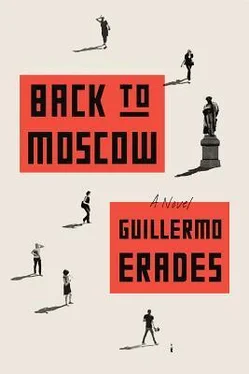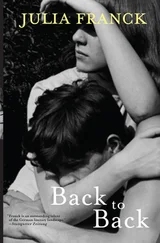At the end of the play the local battalion moves out of town and Vershinin has to leave with the other officers. Masha returns to her husband, who accepts her back despite his knowledge of the affair. This being Chekhov, there is no judgement, no punishment.
The sisters realise they will never go back to Moscow. They will grow old in the provinces. And they accept their destiny — settling for less than they had hoped for.
If life has meaning, it’s not something within the grasp of Chekhov’s characters. They are imperfectly human, shortsighted, and yet fully aware of their own insignificance. Life is a succession of dull moments, sometimes interrupted by short bursts of joy, always full of irrelevant thoughts that keep us distracted as we get older, dreaming of better lives but gradually accepting the unimportance of our own existence.
Then, one day, we die and everything is forgotten.
RUSSIA CHANGED FAST DURING the first months of my stay. On the last day of the year, as the world prepared hysterical celebrations for the arrival of a new millennium, Russia’s president — widely regarded as an endearing old man with a drinking problem — went on national TV and, to everybody’s surprise, announced he was resigning from office. As successor, he appointed the latest of his many prime ministers, a relatively unknown politician with an obscure background in the secret services.
At first, Muscovites didn’t seem to give much significance to this. ‘Nothing will change,’ Nadezhda Nikolaevna had told me when we resumed our language classes after the holiday break. ‘They are all thieves anyway.’
But things did change. In fact, it seemed to me that the country had entered a new era.
By early spring everyone had stopped talking about the economic crisis. TV news, which I watched often to exercise my comprehension skills, showed endless footage of the new president, looking young and sober. We could see him every night on the news, practising judo, riding a horse, reprimanding under-performing ministers or winning, pretty much single-handedly, a nasty war in the Caucasus. According to the national media, Russia was now doing great. Overnight, the country had become rich, confident and assertive.
These changes were quickly reflected in Moscow’s clubbing scene. The city entered the elitni era. A new club opened every weekend, each more select than the last. Nightlife was no longer the exclusive realm of dyevs and expats. Russian oligarchs began to show up at the doors of the latest elitni clubs, first in limousines with tinted windows, then in black humvees, always accompanied by an entourage of drivers, okhrannikis and whores.
The nightlife crowd became known as the tusovka, each of us a tusovschik. For some reason that was never explained to me, it was around this time that cafés and clubs began to serve sushi or, rather, a local version of the Japanese delicacy, which in Moscow included plenty of cream cheese, smetana and dill. To keep up with the trend, the tusovka had to learn to use chopsticks.
Elitni clubs came with their own elitni sections, cordoned-off VIP areas, which were only accessible if you spent a few hundred dollars on champagne. It soon became hard for us, humble expats, to get into these clubs. We would be turned away at the door by bouncers who spoke no English and didn’t care that we did.
But we didn’t give up. We, determined Westerners, who had won the Cold War by standing for decades against Russian bullying, were not about to accept defeat without putting up a fight. So now, when out with the brothers, we would always try to make it into the latest of elitini clubs, many of which were no longer called clubs but ‘projects’. Sure, we had to adapt to our new status, make a few concessions, adopt a less prominent profile. We would now ask our taxi driver to drop us round the corner, as the sight of a crumbling zhiguli would instantly kill our chances of passing face control. We would approach the front door of the club in small groups, walking purposefully, radiating self-confidence, barely acknowledging the bouncer, looking as wealthy and as Russian as we could.
Sometimes it worked. And nothing compared to the feeling of gliding through face control, those first seconds after the bouncer has casually beckoned you in, and you step firmly onto the carpet, and you enter a pafosni universe prohibited to mere mortals, chosen because you are handsome, special, and you walk towards the boom-boom beats with your heart full of anticipation and excitement — feeling that you belong in Moscow and Moscow is the centre of the world.
When we were turned away, which was increasingly often, we would hail another car and move to one of the clubs whose prime had passed and which had been forced to adopt a more lenient door policy.
Colin said, you find the best dyevs in these clubs, hot enough to make it through a second-rate face control but not as demanding as in trendier places. But some nights, for reasons we never understood, even these démodé establishments would not let us in, so we would end up in safe old Real McCoy, or Karma Bar, which for years maintained an all-expats-welcome policy and were always packed with young students.
These nights didn’t come cheap. I had to buy rounds of drinks for the brothers when it was my turn, but also for pretty dyevs and their entourage of not-so-pretty friends. I also bought new clothes at the shopping mall in Okhotny Ryad, black shirts and shiny shoes, to fit in among the increasingly exclusive and well-uniformed tusovka.
I was blowing my stipend money fast, and it was meant to last the entire academic year, so, when Stepanov offered me a part-time job, I accepted it at once.
‘It’ll only take you a few hours a week,’ Stepanov said. Then, with a smirk, he added, ‘I’m sure it won’t distract you from your research.’
That was how I started working for Stepanov.
My job description: show up at business meetings wearing a suit, mutter a few words in English, hand out business cards with a smile and a strong handshake. Nothing else, really. Director of Marketing, Insight Investments International, my business card said, good old Latin letters on one side, flashy Cyrillic on the other.
Other than Stepanov and me, Insight Investments International had two staff members, Pavel and Vova, Stepanov’s schoolmates. I was the third ‘I’ of the firm, the International, a Western face investors could trust. But Stepanov was always the one to talk the talk.
I never fully grasped the intricacies of the business but, as far as I gathered from the meetings I was asked to attend, Insight Investments International sold Russian companies, or parts of them, to foreign investors.
In business mode, Stepanov would try to hide his boyish face behind three-day stubble and sunglasses. He always wore a dark suit and a black shirt, a popular look among Russian men at the time, inspired by TV series and movies where the protagonists were always Russian criminals.
‘I think the sunglasses might put some investors off,’ I told him once. We had just met a group of French businessmen who wanted to buy a dairy factory and produce brie and camembert for the Russian market. The conversation had somehow drifted — the French businessmen seemed more interested in nightclubs than in Stepanov’s exposé of Russian cheeses.
‘Bullshit,’ Stepanov said. ‘They love the sunglasses. That’s how they know that I’m well connected, that I really understand business in Russia.’
Every time a deal went through, Stepanov handed me an envelope stuffed with dollars. I was never told how my salary was calculated but, with time, Stepanov’s envelopes got thicker, and I ended up with plenty of cash to spend.
Читать дальше












